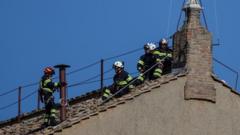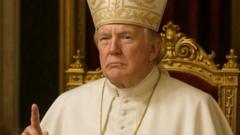In the wake of Pope Francis’ death, the ongoing clerical abuse crisis remains a critical concern for the Catholic Church, prompting survivors to engage the cardinals responsible for choosing the new leader.
Survivors Press Cardinals on Sexual Abuse Crisis Amidst Papal Conclave

Survivors Press Cardinals on Sexual Abuse Crisis Amidst Papal Conclave
As the papal conclave convenes, sexual abuse survivors urge cardinals to prioritize the crisis in selecting the next pope.
In Rome, cardinals have gathered for the conclave to designate a successor to Pope Francis, who passed away last month. Alongside them, survivors of clerical abuse have come forward, expressing their hope to influence the selection process by ensuring the issue of sexual abuse within the church is front and center. The message from advocates is clear: they insist that this haunting legacy cannot be ignored as the Church moves forward.
Matthias Katsch, a representative of Ending Clergy Abuse, highlighted the urgency of their presence, asserting, “I think it’s very important to remind them that we will not go away.” This advocacy group, active in more than 20 countries, aims to promote the voices of survivors, calling for accountability and an active commitment to reform.
According to Matteo Bruni, the Vatican spokesman, discussions regarding sexual abuse have already taken place during pre-conclave meetings. The cardinals acknowledged the problem as a “wound to be kept open,” indicating the necessity of maintaining a dialogue that seeks healing and preventative measures.
Despite being credited for a more proactive stance against clerical abuse compared to his predecessors, Pope Francis leaves behind a complex legacy. Twelve years into his papacy, the issue remains entrenched, leaving critics to question the efficacy of the reforms instigated during his tenure. Although Francis made strides, many argue that more substantial progress is required to comprehensively address the crisis.
The conclave represents a pivotal moment for the Catholic Church, entrusting its future into the hands of selected cardinals who must grapple with both pastoral challenges and the enduring shadow of clerical abuse within their ranks.
Matthias Katsch, a representative of Ending Clergy Abuse, highlighted the urgency of their presence, asserting, “I think it’s very important to remind them that we will not go away.” This advocacy group, active in more than 20 countries, aims to promote the voices of survivors, calling for accountability and an active commitment to reform.
According to Matteo Bruni, the Vatican spokesman, discussions regarding sexual abuse have already taken place during pre-conclave meetings. The cardinals acknowledged the problem as a “wound to be kept open,” indicating the necessity of maintaining a dialogue that seeks healing and preventative measures.
Despite being credited for a more proactive stance against clerical abuse compared to his predecessors, Pope Francis leaves behind a complex legacy. Twelve years into his papacy, the issue remains entrenched, leaving critics to question the efficacy of the reforms instigated during his tenure. Although Francis made strides, many argue that more substantial progress is required to comprehensively address the crisis.
The conclave represents a pivotal moment for the Catholic Church, entrusting its future into the hands of selected cardinals who must grapple with both pastoral challenges and the enduring shadow of clerical abuse within their ranks.



















